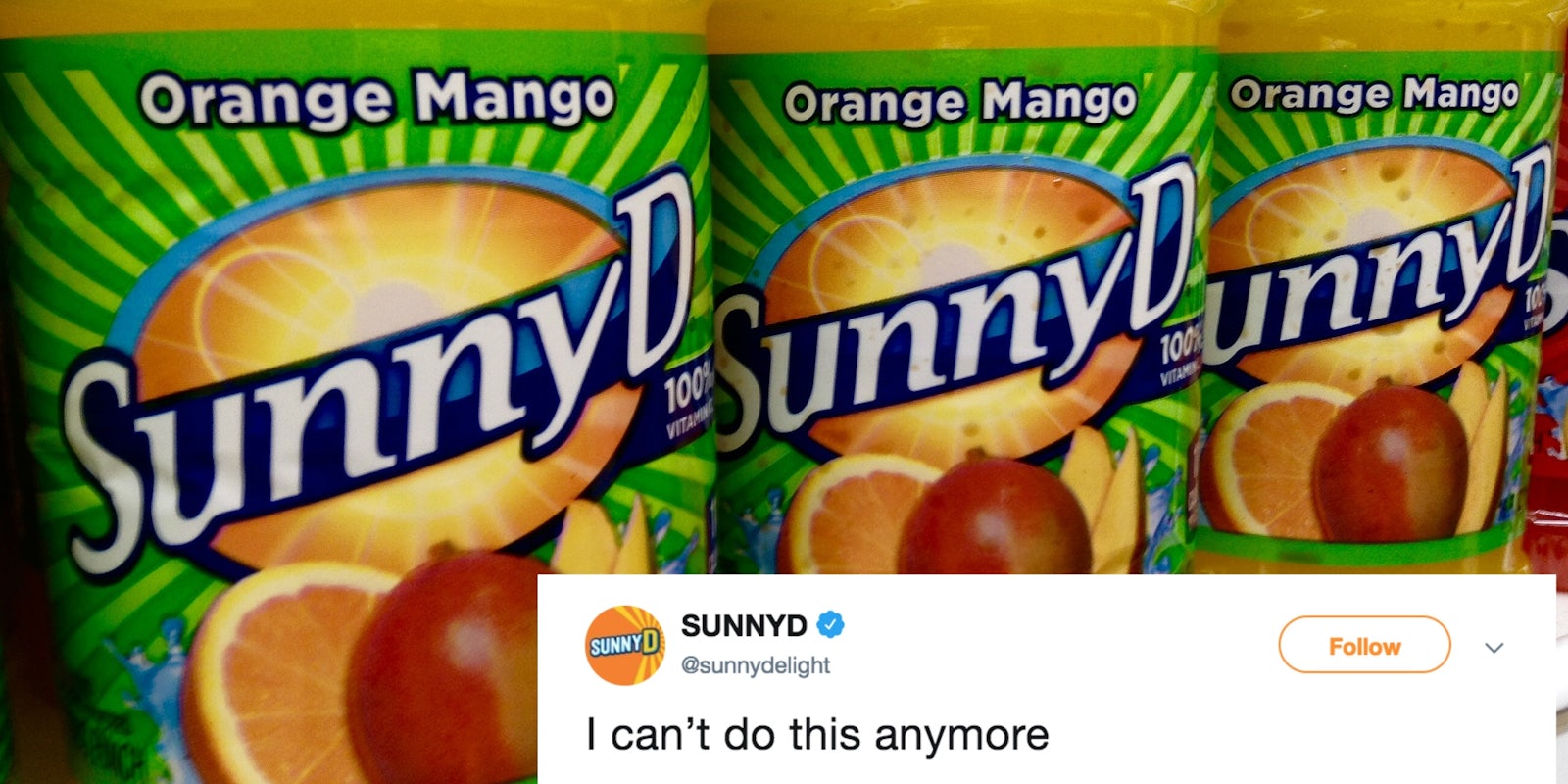Many brands are desperately trying to be Extremely Online and engage with their followers on social media in the same way influencers do. However, the difference is that brands are not people. Sunny Delight is an orange juice, but during the Super Bowl on Sunday, their official account tweeted, “I can’t do this anymore.”
I can’t do this anymore
— SUNNYD (@sunnydelight) February 4, 2019
While the tweets that followed were all in reference to the Super Bowl, which means this tweet was probably also in reference to the low-scoring game, taken out of context it seems a bit like a cry for help.
Either way, other brands came out of the woodwork to offer their support for Sunny D.
Can I offer you a tissue?
— Pornhub (@Pornhub) February 4, 2019
Mood last night. All good MP thanks for checking in ily
— SUNNYD (@sunnydelight) February 4, 2019
here ya go. pic.twitter.com/5IpyVUvFVn
— insomnia cookies (@insomniacookies) February 4, 2019
Other people took the tweet and made it a meme.
*10 minutes into my new diet*
— Betches (@betchesluvthis) February 4, 2019
Me: https://t.co/kjaJITjEnK
college: *presents me with a minor inconvenience*
— evan rogers, male (derogatory) (he/him) (@evonshki) February 4, 2019
me: https://t.co/VNV89BO4J8
When you thought you could handle getting roasted in group chat, but it’s been a rough day at work and the jokes keep coming https://t.co/dva9LyRhKG
— Granny’s Green (@AaronNotAwesome) February 5, 2019
Little Debbie stepped in with some mental health tips, which is when the cryptic tweet took a turn. While the person tweeting for Sunny D may not have intended to open a conversation about depression and mental health, it was interpreted that way.
Please just stick to posting about how your snack cakes have more chocolate in them now or whatever pic.twitter.com/To74I9hEdl
— Brands Saying Bae (@BrandsSayingBae) February 4, 2019
The Twitter account @BrandsSayingBae is an account that calls out corporate Twitter accounts who are trying to sound like a teen wrote it. They commented on the phenomenon of using first person personalities online and SunnyD’s tweet.
“At the end of the day, consumers are people. And people crave authenticity. It’s what they look for in their relationships, their entertainment, and, yes, their brands. Which is why the orange juice account pretends to have depression now, and everyone likes it, and it’s good.”
At the end of the day, consumers are people. And people crave authenticity. It’s what they look for in their relationships, their entertainment, and, yes, their brands. Which is why the orange juice account pretends to have depression now, and everyone likes it, and it’s good. pic.twitter.com/9fNOLZPY1z
— Brands Saying Bae (@BrandsSayingBae) February 4, 2019
Actually, it’s not good. The conversation about mental health has opened up with millennials in the last few years. We’re finally talking openly about it, but when we said we wanted to be able to be open about mental health, I’m not sure we meant that we wanted orange juice to pretend to be depressed. Our childhood snacks talking to each other on Twitter is cute, but using depression as a marketing tool is not.
The internet is on high alert for cryptic tweets like this. Comedian Pete Davidson wrote a similar message on his Instagram last year that said, in part, “I really don’t want to be on this earth anymore. I’m doing my best to stay here for you but I actually don’t know how much longer I can last.”
The post was taken seriously and prompted friends, family and fans to respond. After people checked on Davidson, it turned out he was OK. However, when a brand makes a post like this it makes light of people who are actually struggling.
The backlash on Twitter echoed a similar sentiment. Brands should not be using depression to relate to millennials and Gen Z.
commoditizing the concept of depression and mental health issues to sell fucking sunny D is not OK
— Kyle McKernan (@spacetreasured) February 4, 2019
The plan? Make relatable tweets about depression in order to sell more Sunny D pic.twitter.com/NY0aJw2tws
— Jules (@Julian_Epp) February 5, 2019
https://twitter.com/fluttersnipe/status/1092541336622792704
*asking for help at the grocery store* excuse me, which of these flavoured orange drinks has depression?
— pixelatedboat aka “mr tweets” (@pixelatedboat) February 7, 2019
If brands want to get in on bringing awareness to mental illness, they should look to Hulu. The streaming service released a video after the Super Bowl starring the Instagram-famous egg, who opened up about the pressures of social media and mental health. The video ended by directing viewers to the nonprofit Mental Health America. Hulu wasn’t pretending that the streaming service was having a depressive episode like Sunny D and other brands. While they did personify the egg, they were upfront with their intention in the video. The ad had a clear message and provided helpful information for people who may be struggling.
Sunny D did not respond to a request for comment.
For more information about suicide prevention or to speak with someone confidentially, contact the National Suicide Prevention Lifeline (U.S.) or Samaritans (U.K.).
If you are dealing with mental health issues and need someone to talk to, please check out Mental Health Resources.


